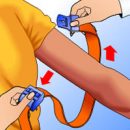The child got into the hospital. Can the parent constantly be near? Does it have the right to interfere in the medical process and abandon certain procedures?
Content
 The worst thing for any parents — not just a sick child, but a child who fell into the hospital. Especially after frightening stories, as a mother refused to be jointly staying with a three-year-old child, or that parents slept on the cold semi of a ten-seater chamber, because they were not allowed to put clamshears.
The worst thing for any parents — not just a sick child, but a child who fell into the hospital. Especially after frightening stories, as a mother refused to be jointly staying with a three-year-old child, or that parents slept on the cold semi of a ten-seater chamber, because they were not allowed to put clamshears.
Let's have a bit of daylight on the burning theme of the rights of parents that produced in the hospital.
The main document on which we rightly rely, — This «Basics of the legislation of the Russian Federation on the protection of citizens» July 22, 1993. N 5487-1.
Right to be with a child
Not only parents, but also any adult family member who parents consider a close to the child enough, is allowed to be in the hospital, while there is a child. (By the way, according to the law on health protection, the child is considered a person who has not reached the age of 15.) Moreover, it is not forbidden to replace each other on duty at the child. (Remember only that according to the laws of politeness it would be nice to warn about this duty doctors and nurses.)
The duration of your stay does not matter: you can be in the hospital as much as the child is treated there, whether it is two hours or two weeks. No fee or work on the hospital you may not have right. Moreover, in case of stay with a child in the hospital, you officially get a hospital sheet. The deadline for which it is issued depends on the age of the child (see. text of the law).
Therapeutic institution is not obliged to provide you sleeping or nutrition. However, it does not have the right to repair the obstacles: you can sleep both with your child, and to make it easier for your own understanding in the ward. Of course, taking care of not to interfere with other patients.
Demand from parents to perform some work on the hospital (washing floors or other labor) no one has the right. But it would be nice, if you were well referred to other children in the ward and on the floor, at their own request, they were watching the cleanliness in the ward, collaborated with duty teams and avoided conflicts with medical staff.
The right to information
You have the right to know the exact formulation of the diagnosis delivered to your child, the prospects for the development of the disease and methods of diagnostics, if difficulties arise with the diagnosis. Remember that there is an international classification of diseases 10 revising. If your child is diagnosed, missing in this classification (for example, vegetative-vascular dystonia or dysbacteriosis), this is a reason to obtain clarification from the attending physician.
According to the law, the doctor does not just can, but is obliged to answer all your questions regarding the health status of your child. Moreover, if you are unclear wording and explanations, you have the right to talk with your doctor until you become clear to you, what is possible and what are possible forecasts.
The right to refuse to receive information
Another important right. If for some reason you do not want to know the features of the course of the child's disease or even the diagnosis, you must inform about this doctor. No one has the right to make you delve into what you do not need or not interesting. You can simply trust the doctors.
Another important note: adverse information should be communicated only to the representatives of the child, but not a child. What and how to talk to a small patient, his parents decide. Parents also determine the circle of persons who may be reported information about the child's illness.
Right to acquaintance with documents
In your requirement, you must provide copies of any medical documents regarding the health of the child. No medustal arguments like «We have no right» or «You will not understand» illegal. Copies of documentation You can not only read in the hospital, but also request for yourself — It is also determined by law.
The right to informed consent
This means that before conducting any procedure that has at least a small potential risk to the health of the child, the doctor is obliged to receive your consent (written). This is especially true of any invasive procedures and especially surgery. That is, everything that has a high risk of complications.
The right not to experience
Since each patient has the right to relieve pain in the course of treatment, you as a representative of the child has the right to inform the doctor about the painful sensations of the child and demand painkillers.
The right to refuse medical intervention
You have the right to refuse any procedures that the doctor offers your child. In this case, you must clarify the consequences of such a refusal and offer alternative treatment methods (if any). Refusal from any medical procedures does not mean a refusal of medical care at all or from discharge from the hospital or issuing you any medical documents.
However, remember that if the doctor considers that you are preparing to provide a child assistance that is necessary to preserve his life, the hospital has the right to apply to the court to protect the interests of a small patient.
Right to choose a facility and doctor
You have the right to choose any hospital for your city, which has free places at the moment — Duty brigade and takes patients on OMS. Motivate the refusal to carry your child to the hospital that meets the listed requirements, the fact that «we are far away in the nearest», The ambulance has no right. You also have the right to choose for your child attending physician. True, provided that the doctor you choose will agree.
You like a parent have a lot of rights that relate to the interaction of a child with a medical institution. If they know about them (and have a printout of the law), many misunderstandings and conflicts can be avoided, which delay the process of treatment and can adversely affect the health of the child. But your task, and the goal of any doctor — give the child the best of possible.









